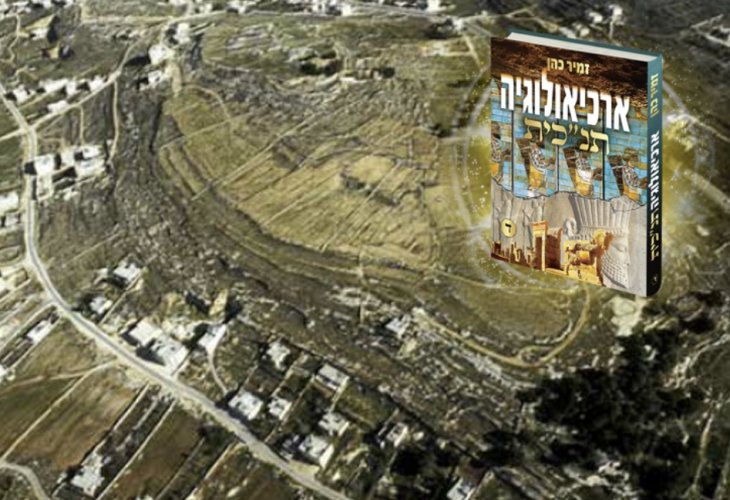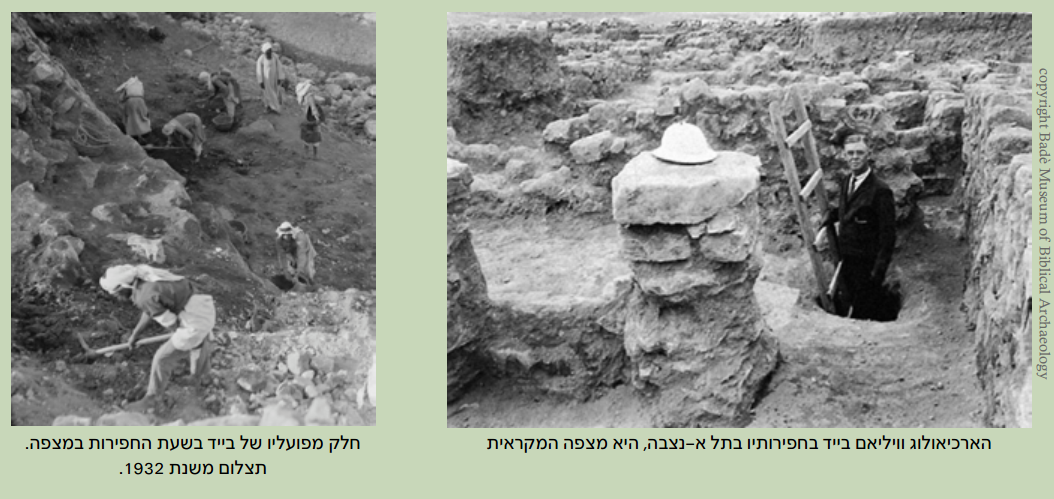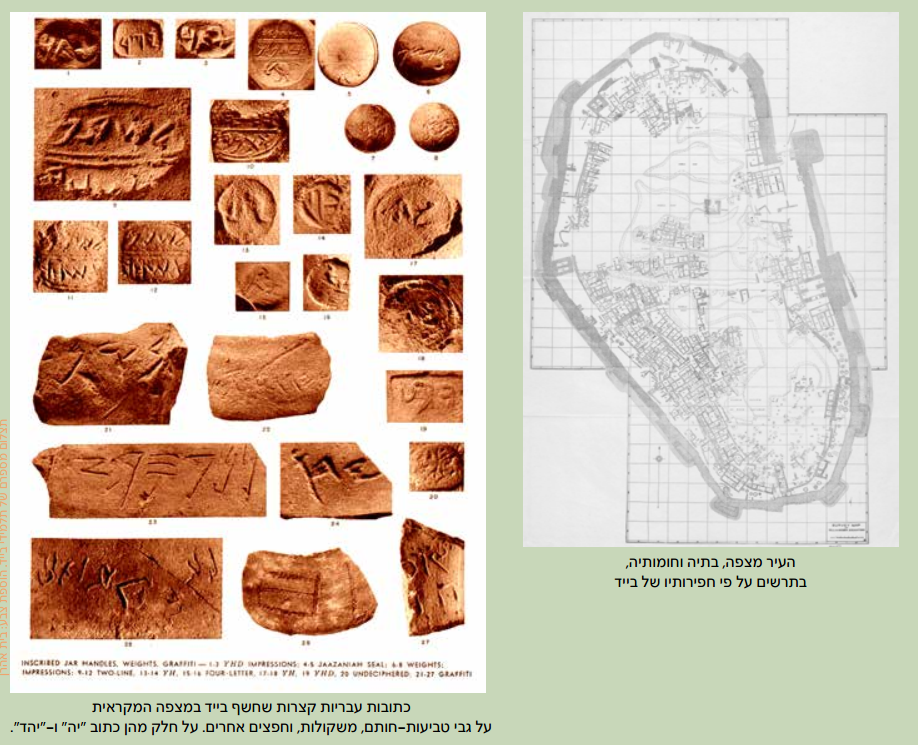Unveiling Biblical Archaeology: The Mystery of Gedaliah's Death
Discover where the seal of Gedaliah Ben Ahikam was found and understand his exact role in history.
 Tell en-Nasbeh, north of Jerusalem, where the remains of the city of Mizpah were found. Gedaliah Ben Ahikam resided there. (Photo: Zeev Radovan)
Tell en-Nasbeh, north of Jerusalem, where the remains of the city of Mizpah were found. Gedaliah Ben Ahikam resided there. (Photo: Zeev Radovan)After the destruction of the First Temple and the final capitulation of the Kingdom of Judah, most inhabitants were exiled to Babylon:
"And the rest of the people that remained in the city, and those who fell away, that fell to the king of Babylon, Nebuzaradan the captain of the guard carried away."
A small group of Judeans, including some soldiers who survived the conflict, managed to escape Jerusalem. Some hid in caves and the Judean desert, while others found refuge across the Jordan.
Nebuzaradan intentionally left behind a small, impoverished Jewish population, under the assumption they'd pose no threat and could maintain a minimal agricultural base to provide food for the Babylonian army in the area, preserving the land as a Babylonian asset, preventing its descent into desolation:
"But the poor of the land, who had nothing, Nebuzaradan left behind, giving them vineyards and fields at that time."
Gedaliah Ben Ahikam
Appointed by Nebuchadnezzar, King of Babylon, Gedaliah Ben Ahikam, a nobleman from the renowned Shaphan family which had prominent roles in the Kingdom of Judah and supported moderation against rebellion, governed the remnants of those left in Judah:
"And over the people who remained in the land of Judah, whom Nebuchadnezzar, King of Babylon, had left, he appointed Gedaliah, son of Ahikam, son of Shaphan."
The Seal of Gedaliah
In British archaeologist James Starkey's excavations at ancient Lachish in the 1930s, a seal believed by scholars to belong to Gedaliah Ben Ahikam was uncovered.
The inscription on the seal reads: "To Gedaliah, who is over the house," dated to the late 7th or early 6th century BCE, the era of Gedaliah Ben Ahikam.
The title "who is over the house" noted on the seal references a position noted in the Bible, similar to a high-ranking official overseeing the royal palace and possibly its economy.
It's presumed Gedaliah, a significant figure in Judah's monarchy, held this title before becoming governor. It's plausible his seal reached Lachish, which served as a secondary capital to Jerusalem at that time.
Additional seals with the name Gedaliah and other royal titles have been discovered around Jerusalem and Judah, acquired through antiquities dealers. Professor Nahman Avigad, upon examining one such seal inscribed "To Gedaliah servant of the king," observed its script matches precisely with the Lachish seal, suggesting "these two officials are likely the same person, with one seal used when Gedaliah was a 'servant of the king' and the other after he was elevated to 'who is over the house.'"
The City of Mizpah
As the new governor, Gedaliah established his residence in Mizpah, near Jerusalem. Mizpah is commonly identified with Tell en-Nasbeh, located on the main road north of Jerusalem. The city is frequently mentioned in the Bible, and the name indicates its position on a high lookout. American archaeologist Professor William F. Badè excavated at Tell en-Nasbeh in the 1920s and 1930s. Findings ranged from the time of the judges to Persian rule, and numerous "To the king" seals were found, indicating the location's importance during the monarchy. There were no signs of Babylonian conquest destruction, leading to the assumption Mizpah may have surrendered and avoided the fate of other Judean cities, making it an ideal seat of power for Gedaliah.
 (copyright Badè Museum of Biblical Archaeology)
(copyright Badè Museum of Biblical Archaeology) (Photo from Badè’s students' book. Color added: House of Aharon)
(Photo from Badè’s students' book. Color added: House of Aharon)Hope for the Redemption of Judah
Upon Gedaliah's appointment by the Babylonian king, Israelite refugees flocked to Mizpah, yearning for recovery. Jeremiah the Prophet himself was present:
"And Jeremiah went to Gedaliah son of Ahikam at Mizpah; and dwelt with him among the people remaining in the land. And when all the captains of the forces in the fields and their men heard the king of Babylon had appointed Gedaliah, they came to Gedaliah at Mizpah... And all the Jews in Moab, Ammon, Edom, and elsewhere that heard the king had preserved a remnant for Judah returned and came to Gedaliah at Mizpah."
Gedaliah declared that recovery was possible if they adhered to Babylonian rule:
"Gedaliah Ben Ahikam, son of Shaphan, swore to them and their men, saying, do not fear serving the Chaldeans; dwell in the land and serve the King of Babylon, and it shall be well with you."
The Seal of Jaazaniah
One of the "captains of the forces," remnants of Judah's military, joining Gedaliah at Mizpah was a notable figure named Jaazaniah:
"When all the captains of the forces, they and their men, heard the king had appointed Gedaliah, they came to Gedaliah at Mizpah... and Jaazaniah the son of the Maacathite and their men."
Jaazaniah is a Jewish name found in the Bible from this period, meaning "He will listen, Hashem."
During Professor Badè's 1932 excavations at Mizpah, a tomb containing a Hebrew seal inscribed "To Jaazaniah servant of the king" was discovered. The seal dates back to the late 7th or early 6th century BCE, aligned with the times of Gedaliah and Jaazaniah son of the Maacathite, who resided with Gedaliah at Mizpah.
Professor Badè noted in his publication: "The find holds exciting biblical significance. It is none other than an onyx seal of one of the military leaders listed by name in 2 Kings 25:23, who came to Gedaliah at Mizpah... Its owner being the very Jaazaniah mentioned in the scripture I cited... This discovery dramatically affirms the identification of Tell en-Nasbeh as the Mizpah in Benjamin, which became Judah's capital after Jerusalem's destruction by the Babylonians."
A rooster etched in an aggressive stance was found at the bottom of the seal. Badè mentioned, "The belligerent rooster suits a military man's seal."
The Assassination of Gedaliah Ben Ahikam
However, the Jews' hopes to return to normalcy in Judah were short-lived. Gedaliah and his supporters, along with Babylonian soldiers, were treacherously murdered by a Jewish military man named Ishmael Ben Nethaniah and his followers:
"In the seventh month, Ishmael son of Nethaniah, son of Elishama of royal descent, along with ten men, came to Gedaliah Ben Ahikam at Mizpah, and they ate bread together there. Then Ishmael son of Nethaniah and the ten men who were with him arose and struck Gedaliah Ben Ahikam son of Shaphan with the sword and killed him... and also struck all the Jews with Gedaliah and the Chaldeans who were there, men of war."
The Seal of "To Ishmael Ben the King"
The Bible recounts Ishmael being from the royal family of Judah and serving as an elite ("RABBI") officer in the royal court before the destruction:
"Ishmael son of Nethaniah son of Elishama, of the royal family and a royal official."
A seal of a notable named "To Ishmael Ben the King" was bought from a Jerusalem antiquities dealer and resides in W. Stern's private collection in New York. Archaeologist Dr. Gabriel Barkai examined it and theorized the owner was indeed Ishmael Ben Nethaniah, who conspired against Gedaliah Ben Ahikam and assassinated him.
The title "Ben the King" was applied not only to royal offspring but also to those with familial ties or prestigious positions in the royal court. Ishmael Ben Nethaniah fits this definition, with Dr. Barkai noting the seal likely remained with Ishmael from his days at the royal court.
To purchase "Biblical Archaeology" Volume 4, click here.

